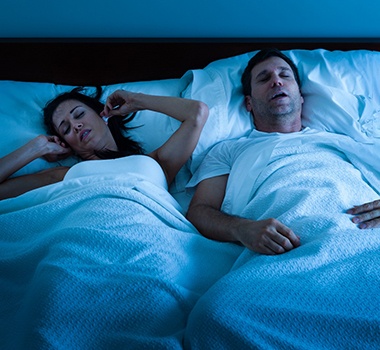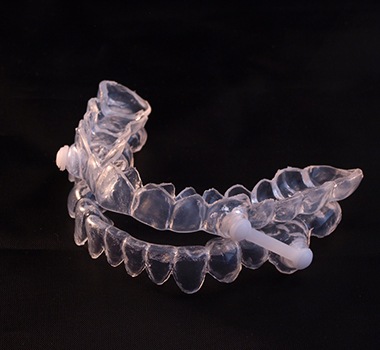Sleep Apnea Therapy – Landrum, SC
Address the Origin of Your Sleep Issues
Do you ever wake up tired even though you went to bed early and gave yourself plenty of time before the alarm went off? There didn’t seem to be an obvious reason, so you just figure it will get better with time. But then it happens again, and so on. When you see a pattern developing, and even healthy changes to your diet are having no effect, it’s time to seek professional help.
Although it’s an underdiagnosed condition that’s difficult to identify on your own, approximately 22 million Americans have sleep apnea. If you may be one of them, the team here at Parkside Dental can help with sleep apnea treatment and minimize the risk of other potential issues developing down the line. Give us a call to learn more and begin your path back to a restful night’s sleep!
Why Choose Parkside Dental For Sleep Apnea Therapy?
- Multiple Oral Appliances Available
- Viable Alternative to CPAP Machine
- Flexible Financing from CareCredit
What Is Sleep Apnea?

Sleep apnea is a sleep disorder that can potentially be serious since your breathing repeatedly stops and starts. If you snore loudly and feel tired even after a full night’s sleep, you should consider sleep apnea a prime suspect. The main types of sleep apnea are:
- Obstructive sleep apnea (OSA) is the most common form that occurs when throat muscles relax and block airflow into the lungs.
- Central sleep apnea (CSA) occurs when the brain doesn’t send proper signals to the muscles that control breathing.
- Mixed sleep apnea (MSA) is a combination of central and obstructive factors occurring in the same episode of sleep apnea. Episodes of MSA most often begin as OSA and are treated as such.
Symptoms of sleep apnea during sleep are usually first noticed by a sleep partner or housemate. The most common symptoms are slowed reaction times, mood swings or irritability, daytime fatigue, chronic snoring, restless sleep, and waking up to urinate in the middle of the night.
The Dangers of Sleep Apnea

Unfortunately, the lack of productive sleep is far from your only concern with sleep apnea. It directly translates into daytime fatigue which can involve irritability, depression, and more. Your work can become more stressful and take longer to complete. Driving or operating heavy machinery can put you and others in harm’s way.
High blood pressure is a potential problem since it strains your cardiovascular system. People with sleep apnea are more likely to get type 2 diabetes. Your liver functionality can start to become a concern. You also face an elevated risk of heart disease, heart failure, stroke, metabolic syndrome, adult asthma, and more.
Sleep Apnea Treatment Options

The good news is that hope is not lost for those suffering from sleep apnea. There are available treatment options, and it’s a matter of finding the one that works best for you. CPAP therapy involves keeping a patient’s airway continuously open and stimulating breathing by pumping air with a machine through a facemask. It’s not without disadvantages, however, such as dealing with a cumbersome device, cost, noise, inconsistent relief, and more.
There are sleep studies that can be conducted overnight to provide the most accurate diagnosis for OSA. If you’ve already confirmed you have the disorder, you might be best served seeking oral appliance therapy that your dentist can provide. Customized to fit your mouth for maximum comfort, this simpler snoring treatment option is easy to bring along when you travel.
All you need to do is wear the appliance when you go to bed; it will expand your airway to increase your oxygen flow, and you’ll finally discover the restful recovery you’ve been missing each morning! You can schedule a consultation with Dr. Moneyhun about oral appliance therapy today!
Obstructive Sleep Apnea FAQs
Does Everyone Who Snores Have Sleep Apnea?
Snoring and sleep apnea are two different things. Snoring is the sound caused by the vibration of tissues in the throat as air passes by them. OSA occurs when those same tissues partially or fully block the flow of air. Therefore, while frequent snoring is often a symptom of sleep apnea, it is not a surefire sign that the disorder is present.
In some cases, snoring can be a harmless annoyance. This is often true among people who only snore once in a while, such as when they are suffering from a cold or nasal allergies.
If you suspect that your snoring is related to OSA, you need to undergo a sleep test to receive an official diagnosis.
Can I Diagnose Sleep Apnea on My Own?
Even if you are exhibiting symptoms of OSA, that does not automatically mean that you have it. Even smart devices, like a wearable fitness tracker, can provide insight into the quality of your sleep but cannot diagnosis OSA. You need a professional sleep test, either one performed at home or in a laboratory, to find out whether you have OSA. A qualified physician should review the results of your test in order to provide you with accurate information about what happens while you are asleep.
Will My Sleep Apnea Go Away If I Lose Weight?
Sleep apnea is quite common in larger individuals. That is because they tend to have excess weight around the neck and abdomen, which can place pressure on the airway and increase the risk of breathing problems during sleep.
Many people have found that after losing just 5 – 10% of their body weight, the quality of their sleep significantly improves. Some individuals even free themselves from OSA altogether by losing weight.
Of course, weight loss does not guarantee that your OSA will go away. The issue may not be related to your weight at all. Rather, it may be due to other problems, such as a narrow airway or deviated septum.
How Soon After Starting Sleep Apnea Treatment Will I Notice Improvement?
After you start treatment, you should notice an improvement in the quality of your sleep right away. However, it may take a few days or longer to adapt to your oral appliance or CPAP. Be patient with yourself as you strive to get used to your device.
After you have been in treatment for a while, your care provider may urge you to undergo a sleep test so they can determine exactly how well your appliance is working.
I Sleep Like a Log; Can I Really Have Sleep Apnea?
Even if you believe you sleep soundly throughout the night, it could still be possible for you to have sleep apnea. In fact, many people who suffer from the condition actually tend to sleep quite heavily. This is because sleep apnea causes disruptions that aren’t always noticeable or memorable, even though these episodes can occur hundreds of times in a given night!
Ironically, it’s often people who claim they “sleep great” who suffer from sleep apnea the most. While it may seem like you’re getting excellent sleep, if you’re waking up without feeling well-rested, your quality of sleep is suffering.
Are There At-Home Remedies for Sleep Apnea?
You may be able to find various products at your pharmacy or online retailers that claim they can help you sleep more comfortably at night. These include items like essential oils, weighted and cooling blankets, and so on. Even certain lifestyle changes can prove useful, such as being more physically active throughout the day or avoiding looking at your phone before bedtime. It’s true that these at-home remedies can help you rest more easily, but they don’t truly treat the cause of your sleep apnea; nothing will ever be as effective as professional treatment.
Since obstructive sleep apnea involves a literal blockage in the airway, it’s always best to address the issue directly, with proper treatment, rather than trying to mask or deal with the symptoms.
Why Visit a Dentist for Sleep Apnea Treatment?
You may wonder what a dentist could possibly do for sleep apnea, and why you’d consider seeing them for treatment. The truth is, most sleep apnea is obstructive, meaning that it’s the result of soft tissues in the mouth and throat collapsing and obstructing the airway. Dentists are actually undisputed experts when it comes to the upper oral respiratory area, since understanding how this part of the body works is crucial for resolving certain oral health issues. The custom-made oral appliances are designed with your specific smile in mind, meaning they’re made for convenience, comfort, and effectiveness.
Plus, you’re already visiting your dentist two times a year—since they’re already so familiar with your oral anatomy, they’re a good person to ask if you believe you’ve been experiencing sleep apnea symptoms.
How Should I Clean My Oral Appliance?
Wearing an oral appliance is normally more convenient and easier to manage compared to operating a CPAP machine; still, you’ll want to ensure that you’re keeping this custom-made device in pristine condition, so that it’s able to do its job. The last thing you should want is for bacteria to accumulate on your device and increase your risk of cavities, gum disease, or other issues aside from your sleep apnea. Right after waking up, take your appliance out so that you can gently brush and rinse it; don’t simply leave it on your nightstand or bathroom counter! Store it in its protective case whenever you aren’t using it, so that it remains safe.
Rest assured, if you have any questions about how to clean (or use) your oral appliance, our team is more than happy to answer them; just give us a call.


